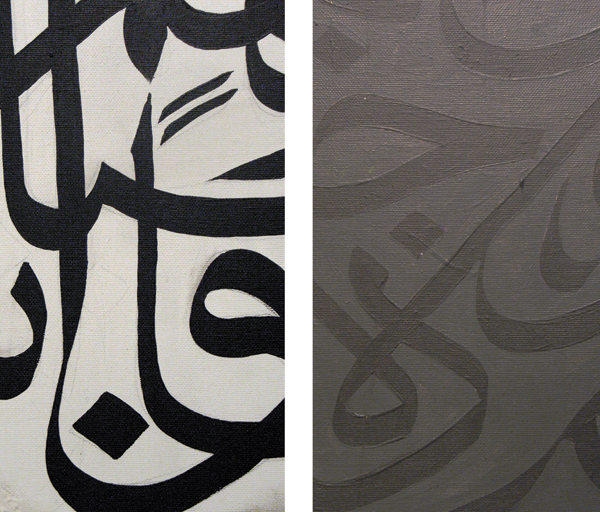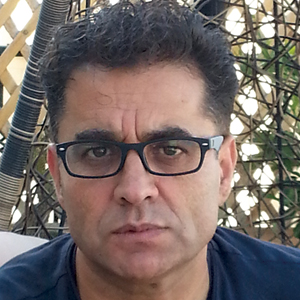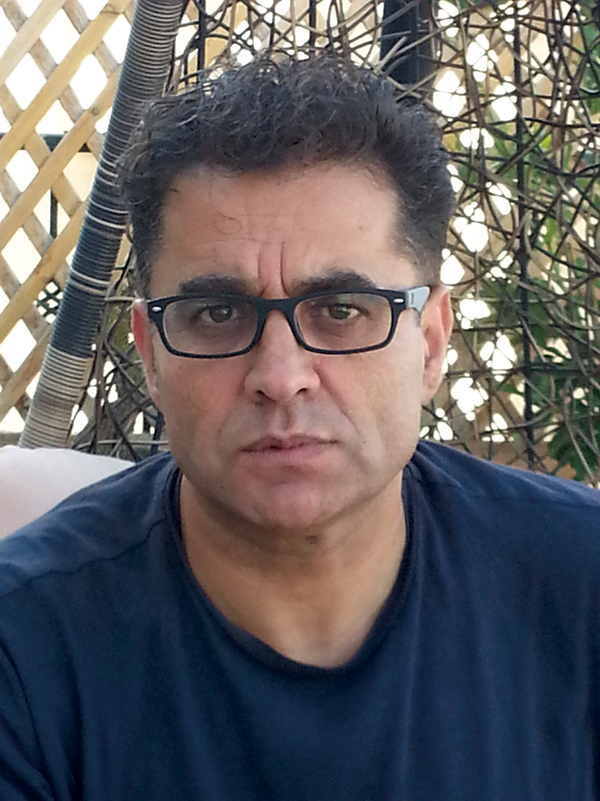Walid Al-Sheikh was born in 1968 in Dheisheh Refugee Camp near Bethlehem. He graduated with a master’s in international law in 1996 from the People’s Friendship University of Russia, Moscow, and works in human rights. He has published four poetry collections Hayth la shegar (There Are No Trees, Amman/Beirut, 1999), Al-Ddahk matruk ‘ala al-masatib (Laughter Left on the Benches, Ramallah, 2003), ‘An takun sgheeran wa la tusaddiq dhalik (To Be So Young Yet Not Believe It, Ramallah, 2007), ‘Andm kul marra (I Regret Every Time, Amman, 2015), and the novel Al-Eajuz yufakkir bi’ashya’ saghira (The Old Man Thinks about Trivial Things, Amman, 2012).
Al-Sheikh is among the pioneers of prose poetry in Palestine; his poems are simple in diction and form, yet “invoke surprise and optic leaps.” His work challenges taboos and celebrates the shameless and indecent. In an interview with Ashraf Az-Zaghal for Laghoo, the website for progressive Arab thought and literature, Al-Sheikh elaborates on how he approaches taboos in creative writing and how he envisions the way forward for Arab writers who address sanctities in a context of censorship and repression. He notes, “If a culture that considers the body a collective property of the family and the tribe, this view in the political sense leads to dispossessing the body of its freedom. Such a perception needs to be changed, even if through shocks.i
Poetry (1999)
It’s like heartbreak
It’s like the allure of women just back from a dance
their hips swaying
their sweat like rosewater
Red flags in a desert
that worships God in silence
It’s like the folly of a fleeing gazelle
which seeing the lion distracted
stops to nibble grass in its final moments
Like a mischievous child, avoiding his homework
and scampering to his mother for kisses
to be startled instead by a slap
he’ll never forget
Like the bleating of a lonesome woman
offering her breast to the sky
planting in her belly woodland trees
which bear no fruit
It’s a stagnant puddle
A waterfall of innocence
The precepts of philosophers slain for their wisdom
Poor women
in new outfits
venturing into the salons of refined conversation
oohing and aahing ever so politely at the guest’s every gesture
It’s a shepherd’s flute
in a field of deferred questions
with which he offers his intercession to God
A guillotine shying away from Dostoevsky’s head
A prophet performing miracles before a crowd of unbelievers
who are put to shame
It’s like the shrewdness of a Bedouin who wraps himself in a cloak
and sees women as desert gazelles, free for the taking
It’s the ache of orphans on the morning of al-Adha feast
some commotion in the dark
between the bodies of a man and a woman
It’s a defiant boy
who nursed at a stranger’s breast
was brought up by a pretty woman
and clung to his dream
It’s the flicker of a candle
suddenly revealing white shores
The misery of an abandoned soul
A scrap from a mourning banner
Evening drenched in loneliness
The possibility of transfiguration far beyond this universe
It’s Baudelaire’s uneasiness in his black girl’s bed
Some additional comments inscribed on a tombstone
Hoarse chants demanding mulberry leaves
What the angels have snatched up to keep for themselves
Village roads lined with sweet basil
scorched by a genius’ words
Keepsake photos of an old soldier
It’s all the sin of the world faced with a test of purity
And it is kohl, too
gracing the eye of the sun
Translated from Arabic by S. V. Atallah.

The collection Water Left on the Terraces constitutes a distinguished development in the poet’s work. Here, the tangible, simple language is spread over various time spaces that are successive at times and intertwined at others, constituting verses on which the poet worked with awareness and perception. Their contents reach the reader through poetic pictures that are deepened by sudden dislodgments that invoke surprise and optic leaps, so that the poem may be devoured at once. In Al-Sheikh’s verses there are cases of poetic blazes that remember with a heightened imagination the recent past as if it were now and invoke the distant closeness as if it were a river flowing backwards.
The poet divides his collection under five titles: “Vision Upwards… Listening to the Lost Footsteps,” “Laughter Left on the Benches,” “Sticky Songs,” “The Fact of the Matter Is,” and “Old Pictures.”ii
We did not rush crying
We did not ask the city inhabitants about the reason
We only…
Got busy arranging our names
According to the alphabet
So that we don’t fall
Martyrs in new fallacies.
With our teeth…
We said
What is said in public
So they fell from the letters’ weight
And it withdrew dragging behind the camp…
Linguistic funerals
Packed in punctured caskets
From which the sin falls…. Only to grow.
i Ashraf Al-Zaghal, Laghoo. Read more at http://www.laghoo.com/2015/06/the-writer-and-the-taboo-with-walid-el-sheikh/.
ii From a review on the website of Beit Al-Shaer, Ramallah. Read more at http://www.ping-palestine.pna.ps/english/publication/barash.html#waled.



